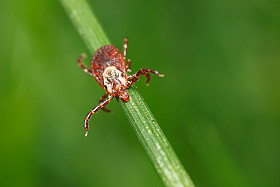 Researchers in Georgia have reported the first probable case of transfusion-transmitted Ehrlichia ewingii, a tick-borne pathogen that typically resides in leukocytes. The case occurred in a 9-year old boy with a history of acute lymphoblastic leukemia and chemotherapy-induced anemia, who presented with fever, malaise, vomiting, diarrhea, and petechial rash. Antibiotic therapy was initiated, but the patient’s clinical status worsened. A transfusion-acquired infection was suspected because the patient had received multiple transfusions prior to experiencing symptoms. Laboratory analysis identified morulae in granulocytes on a peripheral blood smear, and subsequent PCR testing and sequence analysis confirmed that the patient was positive for E. ewingii. Trace-back investigations revealed that the leukoreduced irradiated single-donor platelets received by the patient had come from a donor who had been exposed to ticks. Further serologic testing found that this donor was positive for E. ewingii, with an IgG titer of 1/512. This case suggests that erhlichiosis can be transmitted through transfusion, and that leukoreduction and irradiation of blood products may not entirely eliminate the risk of transmission.
Researchers in Georgia have reported the first probable case of transfusion-transmitted Ehrlichia ewingii, a tick-borne pathogen that typically resides in leukocytes. The case occurred in a 9-year old boy with a history of acute lymphoblastic leukemia and chemotherapy-induced anemia, who presented with fever, malaise, vomiting, diarrhea, and petechial rash. Antibiotic therapy was initiated, but the patient’s clinical status worsened. A transfusion-acquired infection was suspected because the patient had received multiple transfusions prior to experiencing symptoms. Laboratory analysis identified morulae in granulocytes on a peripheral blood smear, and subsequent PCR testing and sequence analysis confirmed that the patient was positive for E. ewingii. Trace-back investigations revealed that the leukoreduced irradiated single-donor platelets received by the patient had come from a donor who had been exposed to ticks. Further serologic testing found that this donor was positive for E. ewingii, with an IgG titer of 1/512. This case suggests that erhlichiosis can be transmitted through transfusion, and that leukoreduction and irradiation of blood products may not entirely eliminate the risk of transmission.
Reference
